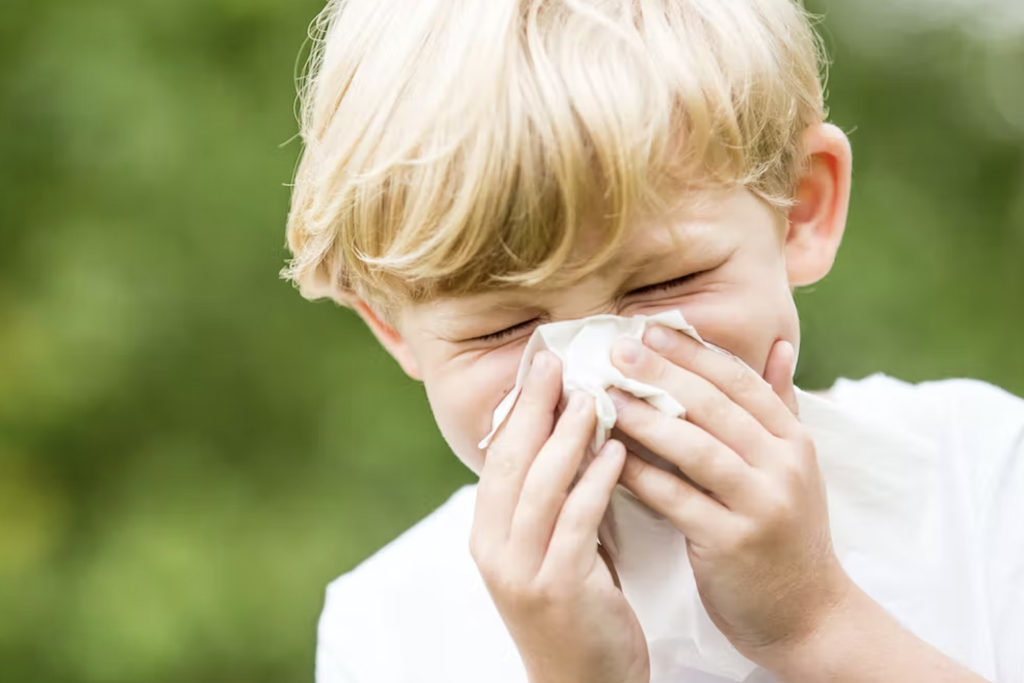Allergy occurs when a person reacts to substances present in food or environment that are harmless to most people. These substances are known as allergens and are found in food, dust mites, pets, pollen, insects, ticks, moulds, and some medications.
Atopy is the genetic tendency of a person to develop allergic diseases. When atopic people are exposed to allergens, they can develop an allergic/immune reaction that leads to allergic inflammation. Depending on what a person is allergic to, the following symptoms can develop:
- Food allergic reactions; mild to moderate or severe allergic reaction (anaphylaxis)
- Nose and/or eyes, resulting in allergic rhinitis (hay fever) and/or conjunctivitis
- Skin resulting in eczema, or hives (urticaria)
- Lungs resulting in asthma
SYMPTOMS of an allergic reaction to food?
Food allergy occurs in around 10% of infants, 4-8% of children, and about 2% of adults in Australia and New Zealand. The most common food allergens are cow’s milk (dairy), egg, peanut, tree nuts, sesame, soy, fish, shellfish and wheat. Almost any substance that is eaten (including herbal medicine) can trigger an allergic reaction.
If you are allergic to a food, symptoms usually start within minutes to an hour of exposure to the food you are allergic to. The symptoms can be mild to moderate or severe. Severe allergic reaction (anaphylaxis) can be life threatening and needs immediate treatment.
Signs and symptoms of mild to moderate allergic reaction include:- Red rash/hives around the mouth, face or body
- Swelling of eyes, lips or face
- Stomach cramps/pain, nausea or vomiting (Abdominal pain, vomiting – these are signs of anaphylaxis for insect allergy)
- Diarrhea
- Difficulty or noisy breathing
- Tongue swelling
- Swelling, tightness or feeling of lump in the throat
- Difficulty talking or hoarse voice
- Wheeze or persistent cough
- Persistent dizziness or collapse
- Pale and floppy (young children)
Mild or moderate food allergic reactions are common in Australia. Severe allergic reactions (anaphylaxis) due to food allergy are less common and deaths from anaphylaxis are rare.
Most deaths from anaphylaxis can be prevented by:Careful food allergen avoidance;
- Correct posture during a reaction (laying flat, in recovery position or sitting with legs outstretched); and
- Prompt administration of adrenaline (epinephrine).
SYMPTOMS of an allergic reaction to environmental allergens?
Allergic rhinitis (commonly known as Hay Fever) affects around 18% of people (children and adults) in Australia. The symptoms are caused by allergy to dust mites, pets, pollen, or moulds.
Symptoms range from mild to moderate (does not affect day to day function), to severe (affects day to day function). Symptoms may occur in a particular season (usually due to allergies to grass, weed or tree pollens), or are persistent and present all year round (usually caused by allergies to house dust mites, moulds or animal dander). It is important to note that allergic rhinitis is not caused by a food allergy.
Immediate signs or symptoms
- Runny nose
- Itchy nose
- Sneezing
- Itchy, watery eyes
Obstructive signs or symptoms
- Congested/blocked nose
- Snoring
- Chronic mouth breathing
Complications of allergic rhinitis may include:
- Sleep disturbance
- Daytime tiredness
- Headaches
- Poor concentration affecting studies and work
- Recurrent ear infections in children
- Recurrent sinus infections in adults
- Asthma which is more difficult to control*
*Some people with allergic rhinitis also have asthma. Better control of allergic rhinitis has been shown to result in better asthma control in both adults and children. Untreated allergic rhinitis may also increase the risk of developing asthma.
What is eczema?
Eczema is a chronic health condition that affects the skin, causing redness, dryness and itching and sometimes infections. When eczema worsens it is called an eczema flare and usually there is no single factor for an eczema flare. Eczema flares can be triggered by a range of irritants or for no obvious reason.
How to diagnose and treat allergiesThere are many effective prevention and treatment options available to help you manage your allergies. Although some people cannot be treated successfully, most people can reduce their symptoms by avoiding exposure to the allergen.
- Consultation with an allergy specialist
- Skin prick tests
- Blood tests if unable to do skin prick tests
- Management and treatment plan
Consult your local doctor if you have an allergy. You may require a clinical immunology or allergy specialist for additional allergy testing and guidance.
If you would like to book a allergy consultation and skin prick testing for your child, you can reach out online or call us on 02 7726 1450.
